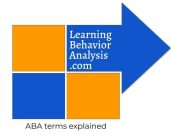A-3: Describe and explain behavior from the perspective of radical behaviorism ©
Want this as a downloadable PDF? Click here!
Target Term: Radical behaviorism

From a radical behaviorist’s perspective, there is no meaningful differences between public events (observable, measurable behaviors) and private events (covert behaviors such as emotions and thoughts). This has extremely profound implications.
Radical Behaviorism
Definition: A branch of behaviorism that includes thoughts and feelings in addition to observable behavioral events. (Distinguished from methodological behaviorism.)
Example in clinical context: Your client engages in intense ritual behaviors which include wearing certain clothing items at certain times of the day. When you try to interrupt the client’s engagement in the ritual, they become extremely aggressive toward you. A team member suggests that this behavior is caused by feelings of frustration. As a radical behaviorist, you do not operate under the assumption that feelings cause behaviors. Rather, feelings can make things in the environment more or less valuable.
Example in supervision/consultation context: A BCBA ® is observing a teacher deliver instruction to a small group of students. As the BCBA is observing, they notice the teacher seems less enthusiastic in their delivery of the content and has trouble sticking to the classroom reinforcement plan. The teacher later explains this by stating that, “I keep thinking that I’ll do a bad job whenever you observe me, so then I mess up the plan.” From a radical behaviorism perspective, the BCBA does not accept that thoughts cause behavior. Rather, thoughts are behavior. Now that this important information from the consultee has been revealed, it will be important for the BCBA to consider how to address the problem in a manner consistent with the laws of behavior.
Why it matters: A radical behaviorism perspective, in addition to knowledge of principles of behavior, can help scientists and practitioners consider the role of private events without drifting to mentalistic explanations for behavior.
